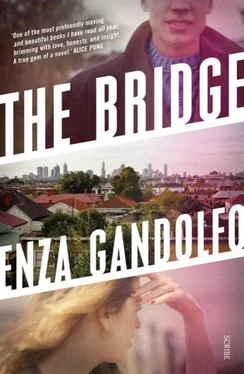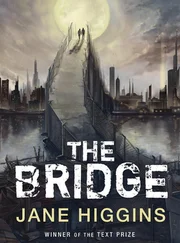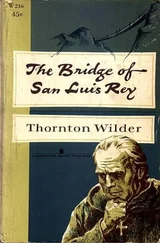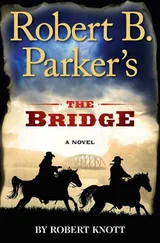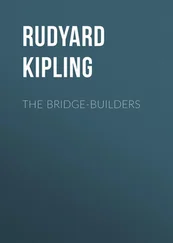Almost two months after the accident, they’d discovered that Paolina was pregnant. His insomnia worsened. The surging panics became more frequent. The sense of impending doom followed him everywhere. He changed his shift at Bradmill’s so that he could walk Paolina to work and be there in the afternoon to walk her home. He didn’t tell her that sometimes he didn’t go home at all, that he sat in the park and watched the school. He didn’t go to work unless he knew that Paolina’s parents or Giacomo were home. Before he left the house he checked that the gas stove was turned off, that the windows were locked. Often, he had to turn back at the front gate and check everything again.
When Alex was born and the nurse handed him their little baby boy, all clean and wrapped up in a blue blanket, Antonello took him reluctantly. The panic rose in waves. His hands shook. The sensation was like the vertigo he’d experienced that first time he went up high on a building site; it left him numb and unable to move. His mother noticed and took the baby. ‘I can’t wait any longer to hold my grandson,’ she said. Relieved, but still trembling, he handed his son to Emilia. Surrounding him in the waiting room were all the fathers who had died on the bridge and all the children they’d left behind.
When the bridge works were completed, all the survivors were sent an invitation to the opening and a toll pass for an initial trip across. They came together in a Victorian government envelope with a letter from the Premier that he couldn’t bear to read. He ripped it into tiny pieces. He swore he’d never drive across the bridge.
For years, the strongest, most persistent impulse was towards death; a desire to stop living. Now Alex and Rae wanted to stop living. But life didn’t stop. It went on whether you lived it or not. You have to choose life . This is what he needed to tell them — you have to choose life . If you stop living, you may as well die. If you stop living, you aren’t going to be able to love again, and everyone you know will pay for that, everyone.
Long days and long nights, no relief at the end of either. No difference. No beginning and no end. There was nothing to mark time, and yet time passed. Sarah rang to tell them that the hearing would be in the new year, probably not until June. The courts had a backlog of cases and Jo wasn’t considered a risk to the community.
Could she spend all those days in the dark room, waiting in limbo?
Summer was on its way now — set on its course like the container ships that slid into the bay from the sea, slow and languid. In the two months since the accident, Jo had left the house twice, and only to go to the police station. Once for the interview. A second time to sign her statement. Before the accident, she rarely spent a whole day at home. She’d been busy — work, school, the gym, hanging out with Ash.
On the days Mandy was at work and Mary didn’t visit, Jo dragged herself to the back verandah and sat looking out at her mother’s garden. She avoided looking over the fence at the bridge. She was meant to be doing something: at least preparing herself for what was to come. But the world was a blur. She tried to shift the angle, to stand in a different light, but the picture refused to come into focus.
Ash was everywhere. Jo knew ghosts didn’t exist, but Ash’s voice was clearer than her own. She rarely slept, but when she did Ash appeared in a recurring dream: Ash, kneeling in a garden bed in the centre of a large kitchen, her face pasted with dirt. Rivers of dried mud wound around her legs. No sense of inside or outside.
‘What is it like to be dead?’ Jo asked.
Ash was digging. Mud caked into her fingernails.
‘What is it like to be dead?’
The morning light was streaming in through the kitchen window. Ash was wearing the blue top and skirt she’d worn to the party. The flowers in the garden were dying: yellowed stems, rotting petals.
Jo marked all the would-have-been milestones from her bed — the school formal, their graduation, the beginning of their VCE exams. English would have been her first, Geography her last. Were Mani and Laura going on with their lives as if nothing had changed?
On the morning that would’ve been the first day of the Schoolies Week holiday at Byron Bay they’d planned a year ago, Jo, unable to bear the house any longer, waited until Mandy left for work and got dressed. Like a small-time criminal in an American detective series, she put on a pair of sunglasses and a cap as a disguise. She opened the front door to a hot wind and a heady cocktail of diesel and petrol as cars and trucks hurtled down Hyde and Francis. Next door, Mrs Nguyễn was listening to morning television. Across the road, behind the cyclone-wire fence, there were several men in safety jackets and helmets. The tanks, still and defiant, shrugged them off. The men reminded her of the plastic characters her Grandpa Tom used to buy her as a child. In the evenings they’d build tall towers with her blocks, a world for the miniature men and women, and her grandfather would make up the stories.
She locked the door. At the gate she hesitated, unsure which way to go. Against the clear sky the bridge was monumental, a towering monolith. The sight of it made her want to crawl back into the house.
If she went into Yarraville, no more than five minutes away, it was likely she’d see someone she knew. She couldn’t imagine that. For almost two months now, her mother, her grandmother, Sarah, and the police were the only people she’d seen.
If Ash were alive, they might’ve gone to Williamstown for a swim on a warm morning like this. They might’ve spent the day sitting on towels on the crowded beach, surrounded by families with picnic baskets and beach shades, playing spot-the-cute-guy, reading novels, falling asleep in the sun, and speculating about their VCE results.
Hyde Street was empty, so she headed north, towards Footscray Station. Anxious someone might see her, she found it impossible to walk, and so she ran, sweat building before she’d reached the next intersection. But she kept going, into the station and onto a train seconds before it left. She scanned the carriage. There was a woman with two young children: one, a baby sleeping in his pusher; the other, a little girl in a fairy costume with her face pressed up against the window. The mother was sending a text with one hand, the other lightly touching her daughter’s back. Two seats down there was a man in an orange workman’s jacket, reading the newspaper. At the other end of the carriage, four women, all of them in their sixties, talked in low voices to each other. Jo didn’t recognise any of them, but she sat as far away as she could.
Only two people got on at North Melbourne. A young woman and her boyfriend. They were having conversations — separate ones, into their mobile phones. The girl was speaking in Vietnamese, at a rapid pace. The boy was speaking in English, and his conversation was clipped. The other person was doing most of the talking. Yep… Sure… No… Maybe…
At Flinders Street Station, she followed the other passengers up the escalators, lined up to scan her train pass, and only stopped when she was standing next to the flower seller. Bunches of gerberas and roses, lilies and orchids. Their perfumes, too sweet, shrunk against other smells: car fumes, fried chips, cigarette smoke. Ash’s mother, whenever they came back through Flinders Street, would buy flowers. Sometimes two or three bunches. ‘Mum, can’t you get flowers in Yarraville?’ Ash would complain. She hated sitting on the train with her mother, with the flowers, with her mother talking about the flowers, with her mother taking up an extra seat with the flowers, especially on the busy trains when people would kill for a seat. No one ever asked Rae to move the flowers.
Читать дальше
